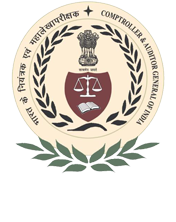Audit Reports

Meghalaya
Report of 2010 - Financial Audit on Commercial of Government of Meghalaya
Overview
This Report contains Civil and Commercial chapters comprising three performance reviews (including one on Chief Controlling Officer based audit) and 15 audit paragraphs, based on the audit of certain selected programmes and activities and the financial transactions of the Government, audit of Government Companies and Statutory Corporations. Copies of the audit paragraphs and performance reviews were sent to the concerned Secretaries to the State Government by the Principal Accountant General (Audit) with a request to furnish replies within six weeks. In respect of two reviews and 13 audit paragraphs in this Report, no response was received from the concerned Secretaries to the State Government.
Targeted Public Distribution System (TPDS), the main objective of which is to ensure regular supply of essential commodities like rice, wheat, kerosene, etc. at reasonable and affordable price particularly to the weaker sections of the society. Review of implementation of the scheme revealed non-finalisation of the list of below poverty line families. The reliability of the Below Poverty Line (BPL)/Antyodaya Anna Yojana (AAY) beneficiaries identified in the rural areas of the State by Community and Rural Development Department in 2002 is questionable as the percentage of number of BPL/AAY families in the State has gone up by almost 10 per cent, despite huge amounts of funds spent on various poverty alleviation programmes in the State during last two decades. The beneficiaries were made to pay higher rate for TPDS commodities and were also issued foodgrains at a reduced scale contrary to the spirit of TPDS. Vigilance, monitoring and inspection were not up to the desired level as envisaged under PDS (Control) Order. Periodical review/check of beneficiaries list has not been carried out by the Department to weed out the bogus ration cards and also eliminate the ineligible families. The objective of regular supply of essential commodities to the weaker sections of society at reasonable and affordable prices, thus, remained largely unachieved.
Payment of post-matric scholarship by the Education Department without proper scrutiny of applications resulted in excess and inadmissible expenditure of RS 2.28 crore. Purchase of meningococcal meningitis vaccine by the Health and Family Welfare Department at higher rate and without immediate requirement resulted in avoidable extra expenditure of RS 3.71 crore and blocking of RS 3.43 crore. Implementation of Urban Traffic Control System project by the Home (Police) Department without proper assessment of its feasibility through proper survey resulted in wasteful expenditure of RS 1.97 crore.

